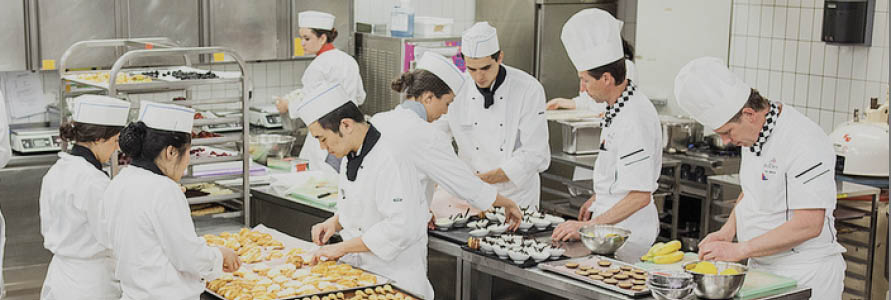For any business, the need to reduce its carbon footprint has become more of a societal pressure than ever before.
A lot of businesses have come under scrutiny for what they contribute to the environment and so efforts have been made by many, to reduce the impact they’re having on things like climate change and counteracting it with eco-friendly practices.
As a hospitality business, food waste is an issue that can be managed more effectively with the right approach. In this article, you’ll learn about the effect that food waste has on our environment and how businesses can reduce the food they waste in general.
If we all make an active contribution to reducing waste in general, we can provide a better environment for all future generations.
The damage that food waste has on the environment
According to WWF as it’s commonly referred to, around one-third of the world’s food goes to waste. That equates to around 1.3 billion tons of food, food that could certainly be reduced if more of an active effort is made.
The problem with this food waste is that it goes beyond a societal or humanitarian issue. It’s an environmental one that causes greenhouse gas emissions, dangerous to the world around us. Around 6-8% of all human-caused greenhouse gas emissions would be reduced if we made efforts to stop wasting food.
However, whilst we want to believe that everyone’s doing their part, that’s not the case. Data from AHLA found that in the US alone, 63 million tonnes of food are wasted and 40% of that comes from consumer-facing businesses aka, the hospitality industry. With that being said here are some ways hotels can reduce their food waste.
1. Engage your teams to be active in reducing waste.
It’s important that your team is involved in the initiative to reduce food waste. They may have helpful insight into the best practices for reducing said waste. Alternatively, you can provide educational resources and campaigns that you run on the premises to actively help reduce any waste that occurs.' Food waste data collected in a kitchen can help drive behavioural change to reduce food waste in the kitchen. Winnow's AI system - Winnow Vision, measures what goes into the bin, and provides the team with daily weekly and monthly reports.
You’d be surprised at how many people will want to help, especially when presented with the harrowing statistics over waste and its impact on our world. Your employees can only help in this mission to reduce waste if you yourself are putting the tools in place to make it happen.
2. Look at your current business operations to spot any problems.
When it comes to your business operations, it’s always a good idea to assess what’s in place and how these might influence the efforts being made to reduce waste. For example, reviewing how food is stored to how it’s prepared and finding out what happens with leftover food.
Assessing the business operations as it stands can paint an accurate picture of what changes need to be made. The reports provided by Winnow on a daily, weekly and quarterly basis provides different layers of granularity for different roles such as chefs, general managers and operations heads.
Identifying these issues is the first step to making any active progress. You could say you have a waste problem but until you understand what that means in relation to your business, you won’t know what needs to be tackled first.
3. Avoid over-ordering stock that could go to waste with demand analysis.
It’s important to make considerations when it comes to stock ordering, especially when it’s easy to over-order. A good way of combating this is by conducting demand analysis. Sometimes, there can be unexpected demand for certain products, take the toilet-roll-gate of 2020 as a prime example.
In hospitality, the same demand can happen at times, whether that be a surge of bookings around the holidays to random events that influence the sale of more products in a short space of time. Demand analysis can help you figure out what it is you need as and when you need it, rather than having to order blindly as a business.
4. Consider how you stock inventory and stock-rotate properly.
Taking stock inventory regularly is important to maintaining the right amount of produce at any given time. Regular stock checks should be made to ensure you’re not running out of anything without your team’s knowledge, after all, there’s nothing worse than being told a dish is off the menu.
Sometimes daily stock takes are required but these should be taken at least once a week to understand how much needs ordering for the following week ahead.
Stock rotation is also important as it helps get rid of the food that’s coming close to its use-by date. A lot of food waste can be reduced with the FIFO method (first in, first out) of stock rotating. It’s also worthwhile labeling your food to date when it was made.
5. Store food correctly.
Storing your food correctly is important because the wrong temperature could ruin the food if you’re not careful.
Making sure you conduct temperature control checks and storing all food in secure tupperware or contains is essential for food hygiene purposes. Some food can go to waste because it’s been exposed whilst in the freezer after not being sealed up properly.
6. Make sure portion sizes are accurate.
Giving your customers good value for money when it comes to your hospitality services is crucial. It’s what will typically bring them back for more. However, in order to reduce food waste, it’s good to take a look at how much food is coming back to the kitchen. Whether they choose to take that food home with them is another thing but there really should be minimal food returning.
If you’re seeing plates with leftovers on them, consider the reasons why that may be. One could be that your portion sizes are too big, even for those that have a big appetite. Try reducing the sizes to improve the rate of empty dishes coming back into the kitchen.
Developed with the behavioral science department at LSE, Winnow Sense is a first of it's kind technology. It will give you a sense of how much plate waste is being thrown away along with the communication tools needed to drive your customers to reduce their waste.
7. Donate any leftover food to charities and local communities.
Helping the local community or charities that would benefit from the leftover food you have on your premises is a great way to reduce waste. It’s also a fantastic feeling to know that you’re giving back to your community and those that are in need.
Some businesses avoid doing this for fear of providing food that has gone off once it arrives, however, if done right, this can be avoided.
8. Compost any food waste if possible.
This isn’t always possible, especially for those in the city and without access to an external space. However, for those businesses that have outdoor garden areas, it’s a great idea to use any food waste possible as compost. This compost can help in growing any flowers in the space to assist with food growth if some of your produce is made on-site. There are also many companies like Waste Lab that compost food on your behlaf.
There are lots of food that you can compost, so it’s worth checking what your kitchen team can use as compost and what needs to be binned. The more you can recycle and reuse, the better for the environment!
9. Encourage customers to take leftovers home.
Finally, where it’s possible, you may want to be more active in encouraging customers to take their leftovers home. A lot of customers may feel shy to ask about taking food home, so why not make it a default question that all your team ask to customers once they’ve finished their food?
It gives customers the option, rather than making a conscious decision to not ask out of politeness. As a business, you can direct that food waste to the responsibility of the customer who is more than likely to finish the food at home. Otherwise, it’s going to go straight into the bin once it returns to the kitchen.
10. Measure your efforts in reducing food waste
Reducing food waste is a great way to improve our environment for the better but it’s worthwhile measuring your efforts as you go. That way, you can take stock of what impact you’re having on the reduction of food waste within the hospitality industry itself.
Winnow is a great option to use in line with lowering food waste and overproducing too much food at once. This type of technology that’s used can help gather insight, pinpoint waste, and better your business decisions.












Comment on my blog